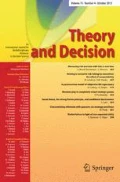Abstract
An analysis of several different indices of voting power reveals that the voting power of a member of a weighted voting body may increase, rather than decrease, when new members are added to the original body. Real instances of this phenomenon, called the paradox of new members, are shown to have occurred when new states were added to the U.S. Electoral College and new countries to the European Community Council of Ministers. Conditions for the existence of the paradox, and probabilities of its occurrence in small and moderate-size voting bodies, are given. Efficient algorithms for the calculation of the voting power indices, based on generating functions, are also outlined.
Similar content being viewed by others
Author information
Authors and Affiliations
Rights and permissions
About this article
Cite this article
Brams, S.J., Affuso, P.J. Power and size: A new paradox. Theor Decis 7, 29–56 (1976). https://doi.org/10.1007/BF00141101
Issue Date:
DOI: https://doi.org/10.1007/BF00141101



